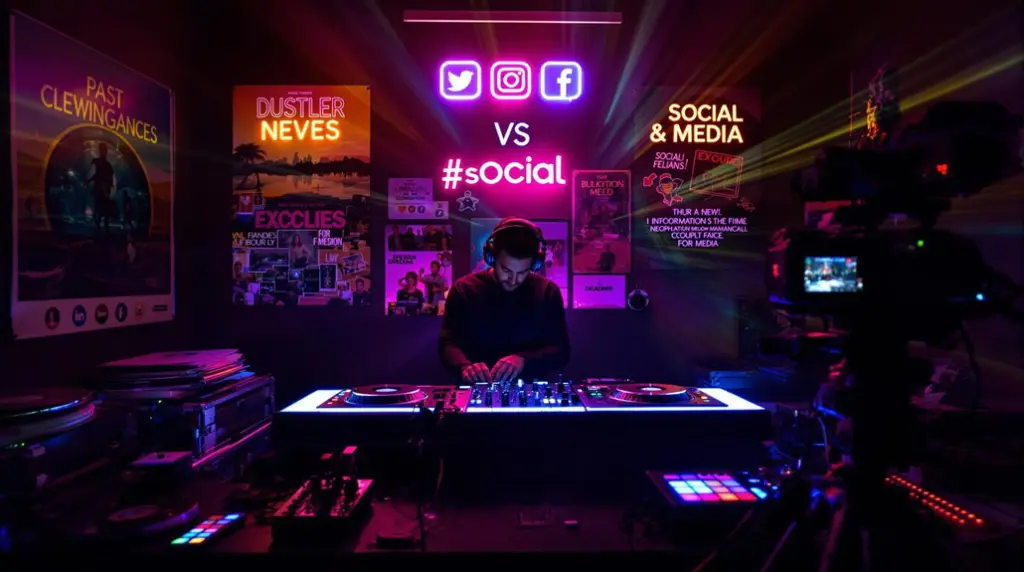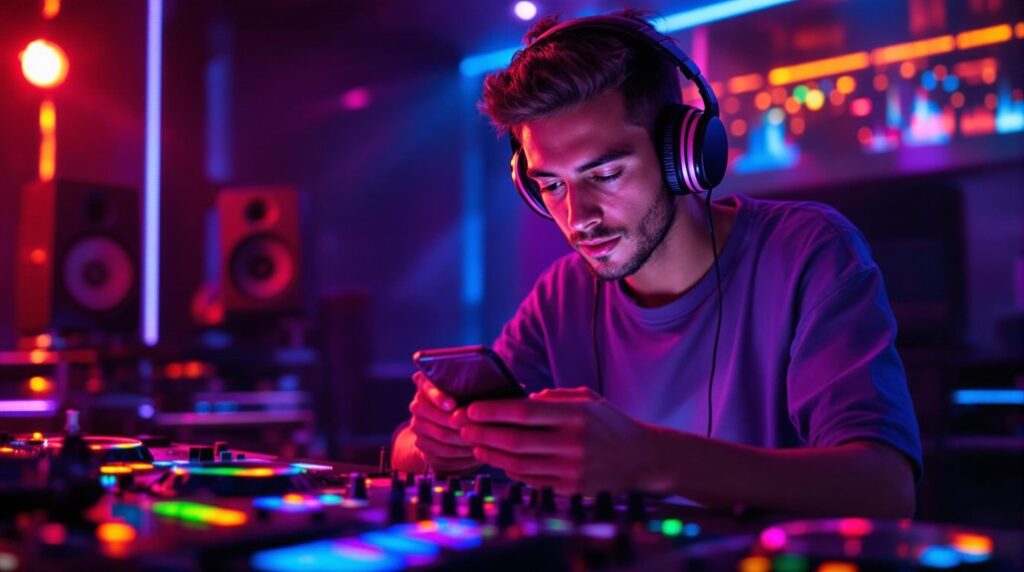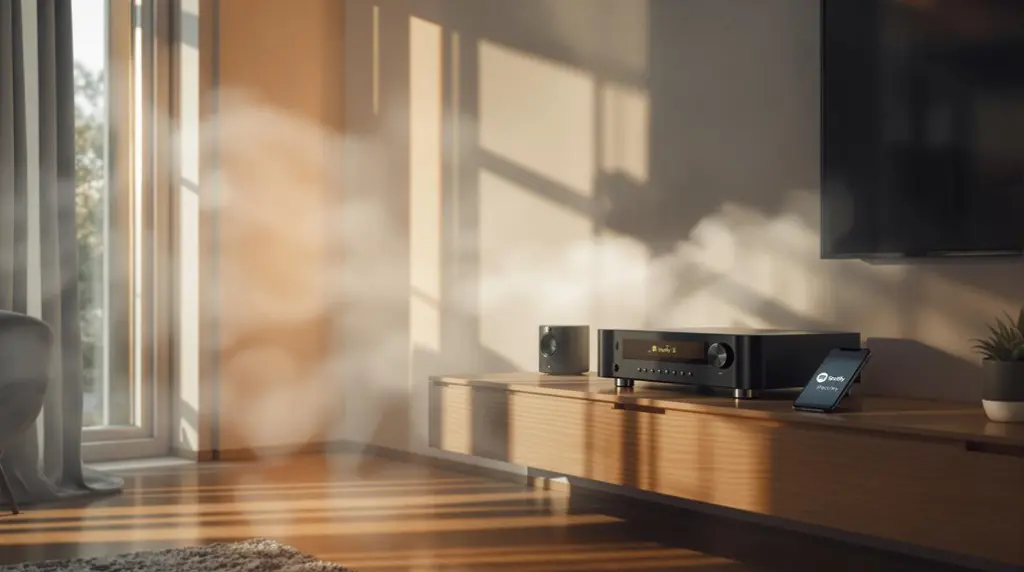To guarantee you’re on solid legal ground in your DJing career, you should first comprehend copyright laws to avoid infringement risks. Obtain the necessary licenses, including sync, master-use, and performance licenses, by engaging with music publishers. Additionally, you can use royalty-free music to manage costs effectively. Always secure direct permissions from rights holders for specific tracks. Adhere strictly to fair use guidelines, especially when mixing or remixing. Document all music sources meticulously, and regularly monitor and update your licenses. By maintaining compliance, you’ll not only protect yourself but also enhance your professional reputation. Explore further to grasp additional nuances and strategies.
Key Takeaways
- Obtain necessary licenses such as sync, master-use, and performance for legal music usage.
- Utilize royalty-free music from platforms like SoundCloud to avoid royalty issues.
- Secure direct permissions from right holders through negotiation and legal agreements.
- Adhere to fair use guidelines by evaluating the purpose and transformative value of music used.
- Maintain organized records of music sources and licensing details to ensure compliance and ease auditing.
Understand Copyright Laws
To successfully navigate your DJ career, it’s important that you understand copyright laws which protect original works from unauthorized use. These laws have significant legal implications and vary internationally, impacting how you can use music in different countries. By grasping the scope of these regulations, you’ll avoid the pitfalls of copyright infringement, which can lead to severe legal consequences.
Copyright laws not only govern the legal aspects but also underscore ethical considerations. As a DJ, respecting music ownership is paramount. This respect manifests not just in legal compliance but in recognizing and valuing the creative labor of artists. Ethically, it’s your responsibility to make certain that all music played in your sets is used according to the legal rights held by the owners.
Understanding these laws isn’t merely about avoiding legal repercussions; it’s about fostering a culture of respect among creators. When you adhere to copyright rules, you set a professional standard and contribute to a sustainable artistic community. Therefore, make it a priority to educate yourself thoroughly on these matters. This knowledge is foundational to conducting your activities within the bounds of both law and morality.
Obtain Necessary Licenses
Understanding copyright laws arms you with the knowledge needed to obtain the necessary licenses for your DJ activities. The licensing process involves securing sync licenses for mixes, master-use licenses for recorded music, and performance licenses for live events. It’s essential to navigate these requirements meticulously to avoid legal pitfalls and make sure that rights holders are compensated fairly.
Engaging with both record labels and music publishers is vital. This dual approach ensures you have all the permissions required to use the music legally. Remember, each track might have different rights holders, adding complexity to the licensing process.
Be mindful of license expiration and the need for renewal. Failing to renew licenses can lead to unintended copyright infringement. It’s important to keep records and set reminders for renewal dates to maintain continuous compliance.
| License Type | Description |
|---|---|
| Sync License | Needed for incorporating songs into mixes |
| Master-Use License | Required for using recorded music |
| Performance License | Necessary for playing music at events |
| Expiration | Track and renew to avoid legal issues |
| Renewal Process | Regularly update to ensure ongoing rights |
Use Royalty-Free Music
Using royalty-free music allows you to sidestep complex copyright issues and focus on your creative process. Platforms like SoundCloud provide a vast array of royalty-free tracks, enabling you to explore diverse genres and styles. This freedom greatly enhances your ability to develop and showcase creative mixing techniques without the burden of licensing fees.
Here are three key benefits of incorporating royalty-free music into your DJing:
- Diverse Musical Selection: You have access to a vast library of unique tracks that can be seamlessly integrated into your sets. This variety not only captivates your audience but also keeps your playlists fresh and engaging.
- Enhanced Collaboration Opportunities: Collaborating with producers becomes simpler when copyright restrictions aren’t a concern. You can freely mix, modify, and experiment with sounds provided by talented creators worldwide.
- Cost-Effective Practice: Utilizing royalty-free music eliminates the need for ongoing royalty payments, reducing the financial barriers to your creative expression.
Secure Direct Permissions
As you navigate the process of securing direct permissions, it’s essential to first identify the correct rights holders, which may include artists, labels, or music publishers.
You must then understand and negotiate licensing agreements that are legally binding and appropriate for your needs.
Identifying Rights Holders
In order to guarantee compliance in your DJing endeavors, you must first identify the rights holders of the music you intend to use. Researching rights holders is critical. Here’s how you can effectively manage this task:
- Research Record Labels and Publishers: Identify the companies associated with your chosen tracks. These entities often hold the necessary rights.
- Communicate Effectively with Artists: Engage directly with artists through their official channels or professional representatives to clarify rights ownership.
- Utilize Licensing Platforms: Many platforms exist that streamline the process of securing permissions directly from rights holders.
Once you’ve identified the rights holders, your next step is to navigate the licensing agreements to secure direct permissions for using their music in your DJ sets. It’s important to understand the licensing pitfalls and legal obligations involved.
Effective communication with rights holders ensures that you obtain written agreements that clearly outline the terms of use. This includes the scope of use and any associated fees or royalty rates. During contract negotiations, always aim for clarity and precision to avoid future legal complications.
Documenting Permission Proof
In order to uphold compliance with copyright laws, you must diligently document all permissions granted by rights holders for the use of their music in your DJ sets. This meticulous approach guarantees legal compliance and guards against infringement claims.
Here are key steps for secure permission documentation:
- Record All Communications: Keep detailed records of all correspondence, including emails and agreements, to serve as proof verification and authorization evidence.
- Document Legal Authorization: Obtain and file copies of signed contracts or written permissions that clearly outline the rights validation and terms of use.
- Secure Storage: Safely store all documentation of permissions to readily defend your rights in any legal disputes or challenges, ensuring rights validation and legal compliance.
Adhere to Fair Use Guidelines
In order to guarantee legal compliance, DJs must adhere strictly to fair use guidelines when incorporating copyrighted material into their mixes. Understanding these guidelines helps you navigate the complex landscape of copyright laws effectively. Common fair use misconceptions may lead you to overstep copyright boundaries unintentionally. It’s important to recognize that fair use permits limited use of copyrighted material, primarily for purposes like criticism or teaching, and doesn’t blanket all forms of usage.
When considering legal sampling and remixing ethics, you should evaluate the purpose of your use: Is it transformative, adding new expression or meaning, or is it merely replicating the original? The nature of the copyrighted work, the amount used relative to the entire work, and the impact of your use on the original market are all critical factors in this assessment. Transformative use, a key component in DJing and remixing, often leans favorably in fair use deliberations, provided it alters the original with new expression or meaning.
Document Music Sources
As you progress in your DJ career, it’s imperative that you verify the authenticity of every music track you use. Tracking your purchase history and organizing digital receipts will establish a clear audit trail and safeguard against potential copyright infringement claims.
This meticulous documentation not only enhances your professional credibility but also simplifies compliance with licensing agreements.
Verify Music Authenticity
You must document the sources of all music used in your DJ sets to guarantee authenticity and ownership compliance. This process involves meticulous music authentication methods and ownership verification to prevent legal issues and uphold copyright integrity.
Here are key steps to make sure thorough authenticity checks and source validation:
- Music Authentication Methods: Utilize recognized platforms and services that provide clear and verifiable music sourcing.
- Ownership Verification: Cross-reference music tracks with copyright databases to verify legitimate ownership.
- Authenticity Checks: Regularly conduct audits of your music library to maintain and update your compliance records.
Track Purchase History
Why should DJs meticulously maintain a detailed track purchase history?
Maintaining robust record-keeping techniques is essential not only for music authenticity verification but also for ensuring compliance with copyright laws.
When you document every music purchase, you create a reliable audit trail that supports ownership documentation.
This practice is invaluable, particularly when you need to prove where your music originated or seek permissions for remixes.
Purchase tracking also facilitates the identification of original artists, which is pivotal for obtaining the appropriate licenses.
Organize Digital Receipts
Organizing digital receipts for your music purchases, downloads, and subscriptions is essential in documenting and verifying the sources of your music library. Here’s how you can guarantee efficient receipt organization and compliance:
- Maintain a Dedicated Folder: Segregate your digital receipts in a separate folder or database. This facilitates quick access and simplifies proof verification of ownership or licensing rights.
- Detail Your Records: Include specifics such as purchase dates, platforms used, and details of license agreements in your documentation to effectively track your music library.
- Regular Reviews: Periodically update and review your receipts to confirm ongoing compliance with copyright laws and licensing requirements.
These steps are vital in maintaining a transparent and legally compliant DJ practice.
Monitor and Update Licenses
Consistently monitoring and updating your music licenses is essential to guarantee compliance with evolving copyright laws. You should regularly check the expiration dates of your licenses to mitigate the risks associated with license expiration. Ignoring these dates could expose you to severe legal consequences, including potential lawsuits or fines. Setting up license renewal reminders can serve as an effective strategy to maintain continuous legal compliance.
Furthermore, it’s critical to stay abreast of compliance updates that may influence your DJing practice. Changes in licensing requirements or regulations could necessitate adjustments in your licensing agreements. Promptly updating your licenses when incorporating new music into your repertoire is necessary to avoid copyright infringement. Each addition to your musical collection requires a careful review of the specific terms and conditions to ensure you’re operating within legal boundaries.
Additionally, maintaining detailed records of all your music licenses is essential. These records not only help you manage your licenses more efficiently but are also crucial in demonstrating your compliance in the event of audits or inquiries. By adhering to these practices, you’re not only protecting your professional reputation but also ensuring your DJing activities remain uninterrupted.
Frequently Asked Questions
How Do DJS Avoid Copyright Infringement?
To avoid copyright infringement, you need to secure performance licenses for live events and remix rights for altering tracks. Utilizing royalty-free music and obtaining necessary sync and master-use licenses are also essential steps.
Does a DJ Need Copyright?
You don’t need to own copyright as a DJ, but understanding licensing essentials and securing performance rights is essential to legally play music and respect the rights of original creators.
How Do You Avoid Copyright on Music?
To avoid copyright on music, you’ll need to secure appropriate music licensing. Utilize fair use principles judiciously and consider using royalty-free tracks to guarantee compliance and avoid legal repercussions in your musical projects.
What Are DJ Rules?
DJ rules mandate securing venue permissions and following equipment regulations to guarantee compliance at events. You’ll need to obtain the necessary licenses to play copyrighted music legally and professionally.
Conclusion
As a DJ, you must meticulously adhere to copyright laws to avoid legal repercussions. You should make sure that all licenses are up-to-date and properly documented. Using royalty-free tracks and obtaining permissions directly when necessary will safeguard your compliance.
Always remember, the integrity of your music sourcing can define your professional reputation. Stay informed and proactive about copyright rules to maintain the legality and ethical standing of your performances. This diligence is essential for your career’s longevity and success.




